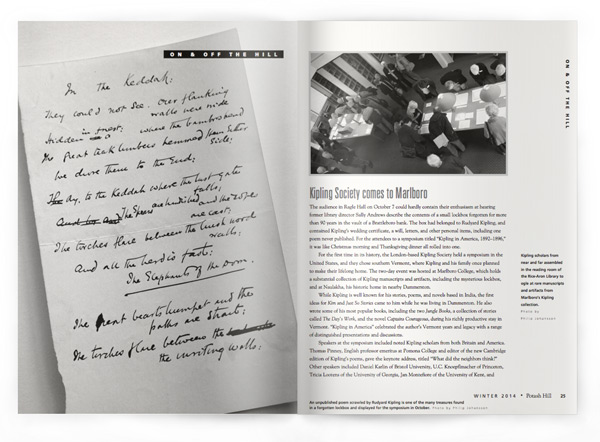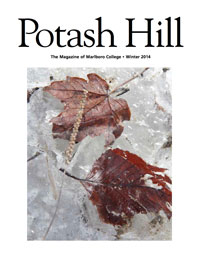
The audience in Ragle Hall on October 7 could hardly contain their enthusiasm at hearing former library director Sally Andrews describe the contents of a small lockbox forgotten for more than 90 years in the vault of a Brattleboro bank. The box had belonged to Rudyard Kipling, and contained Kipling’s wedding certificate, a will, letters, and other personal items, including one poem never published. For the attendees to a symposium titled “Kipling in America, 1892–1896,” it was like Christmas morning and Thanksgiving dinner all rolled into one.
For the first time in its history, the London-based Kipling Society held a symposium in the United States, and they chose southern Vermont, where Kipling and his family once planned to make their lifelong home. The two-day event was hosted at Marlboro College, which holds a substantial collection of Kipling manuscripts and artifacts, including the mysterious lockbox, and at Naulakha, his historic home in nearby Dummerston.
While Kipling is well known for his stories, poems, and novels based in India, the first ideas for Kim and Just So Stories came to him while he was living in Dummerston. He also wrote some of his most popular books, including the two Jungle Books, a collection of stories called The Day’s Work, and the novel Captains Courageous, during his richly productive stay in Vermont. “Kipling in America” celebrated the author’s Vermont years and legacy with a range of distinguished presentations and discussions.
Speakers at the symposium included noted Kipling scholars from both Britain and America. Thomas Pinney, English professor emeritus at Pomona College and editor of the new Cambridge edition of Kipling’s poems, gave the keynote address, titled “What did the neighbors think?” Other speakers included Daniel Karlin of Bristol University, U.C. Knoepflmacher of Princeton, Tricia Lootens of the University of Georgia, Jan Montefiore of the University of Kent, and Judith Plotz of George Washingon University. David Richards, editor of the definitive Kipling bibliography, discussed a recently discovered manuscript with writing advice from Kipling to his sister-in-law Josephine.
The eagerly anticipated Marlboro collection included the humorous biography of publisher George Putnam, “born of poor but most disreputable parents,” carefully printed on a single sheet of toilet paper. It also included a little-known but important memoir by Mary Cabot, a local historian and close friend of the Kiplings, who gives a rare and intimate picture of their personal lives and relations.
“This is particularly valuable because they were reclusive,” said Tom Ragle, former president of Marlboro College, who presented the Marlboro Kipling collection along with Andrews and current library director Emily Alling. “They tried to shun the unwanted publicity that seemed to follow them about. By that time Kipling was a major celebrity.”
The second day of the symposium was hosted at Naulakha, which the Kiplings designed and had built for them—now beautifully and authentically restored by the Landmark Trust USA. In addition to a tour of Naulakha, participants were treated to a talk by Charles Fish of the Dummerston Historical Society on “Vermont and Vermonters in Kipling’s Day,” as well as readings by Mary Hamer from her novel about Kipling and his sister, Kipling and Trix.

